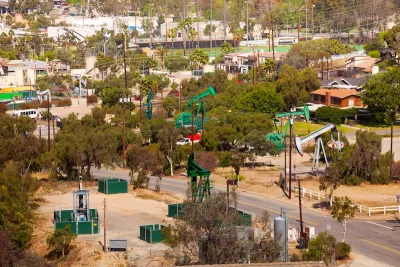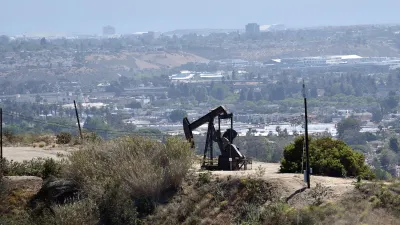The concept of a "just transition" extends beyond workers to encompass broader social and environmental dimensions, including the restoration and regeneration of land and communities affected by oil extraction activities.

The concept of a “just transition,” which focuses on shifting from fossil fuels to renewable energy while ensuring equity and inclusion, is exemplified by the transformation of oil fields into parks. This initiative addresses environmental degradation caused by oil extraction by restoring and regenerating the land. Efforts such as soil remediation, reforestation, and the creation of green spaces help mitigate environmental damage, support biodiversity, and contribute to carbon sequestration, playing a crucial role in combating climate change.
Economically, converting oil fields into parks creates new job opportunities in environmental remediation, landscaping, construction, and park management. This transition allows former oil industry workers to be retrained and redeployed, ensuring they are not left behind in the move to a green economy. Additionally, the new parks can boost local economies and attract tourism, providing sustainable revenue streams for communities.
From a social perspective, turning oil fields into parks significantly enhances community health and well-being. These green spaces reduce pollution, improve air and water quality, and offer areas for recreation and relaxation, fostering a sense of community. The initiative also addresses social equity by providing marginalized communities, often disproportionately affected by environmental burdens and hazards, with access to much needed green spaces. Moreover, it includes cultural preservation efforts, particularly for Indigenous communities, by incorporating spaces for cultural practices and education, strengthening cultural identity and pride.
FULL STORY: Transforming Oil Fields into Parks: A Cornerstone of Just Transition

Alabama: Trump Terminates Settlements for Black Communities Harmed By Raw Sewage
Trump deemed the landmark civil rights agreement “illegal DEI and environmental justice policy.”

Planetizen Federal Action Tracker
A weekly monitor of how Trump’s orders and actions are impacting planners and planning in America.

The 120 Year Old Tiny Home Villages That Sheltered San Francisco’s Earthquake Refugees
More than a century ago, San Francisco mobilized to house thousands of residents displaced by the 1906 earthquake. Could their strategy offer a model for the present?

In Both Crashes and Crime, Public Transportation is Far Safer than Driving
Contrary to popular assumptions, public transportation has far lower crash and crime rates than automobile travel. For safer communities, improve and encourage transit travel.

Report: Zoning Reforms Should Complement Nashville’s Ambitious Transit Plan
Without reform, restrictive zoning codes will limit the impact of the city’s planned transit expansion and could exclude some of the residents who depend on transit the most.

Judge Orders Release of Frozen IRA, IIJA Funding
The decision is a victory for environmental groups who charged that freezing funds for critical infrastructure and disaster response programs caused “real and irreparable harm” to communities.
Urban Design for Planners 1: Software Tools
This six-course series explores essential urban design concepts using open source software and equips planners with the tools they need to participate fully in the urban design process.
Planning for Universal Design
Learn the tools for implementing Universal Design in planning regulations.
Clanton & Associates, Inc.
Jessamine County Fiscal Court
Institute for Housing and Urban Development Studies (IHS)
City of Grandview
Harvard GSD Executive Education
Toledo-Lucas County Plan Commissions
Salt Lake City
NYU Wagner Graduate School of Public Service





























